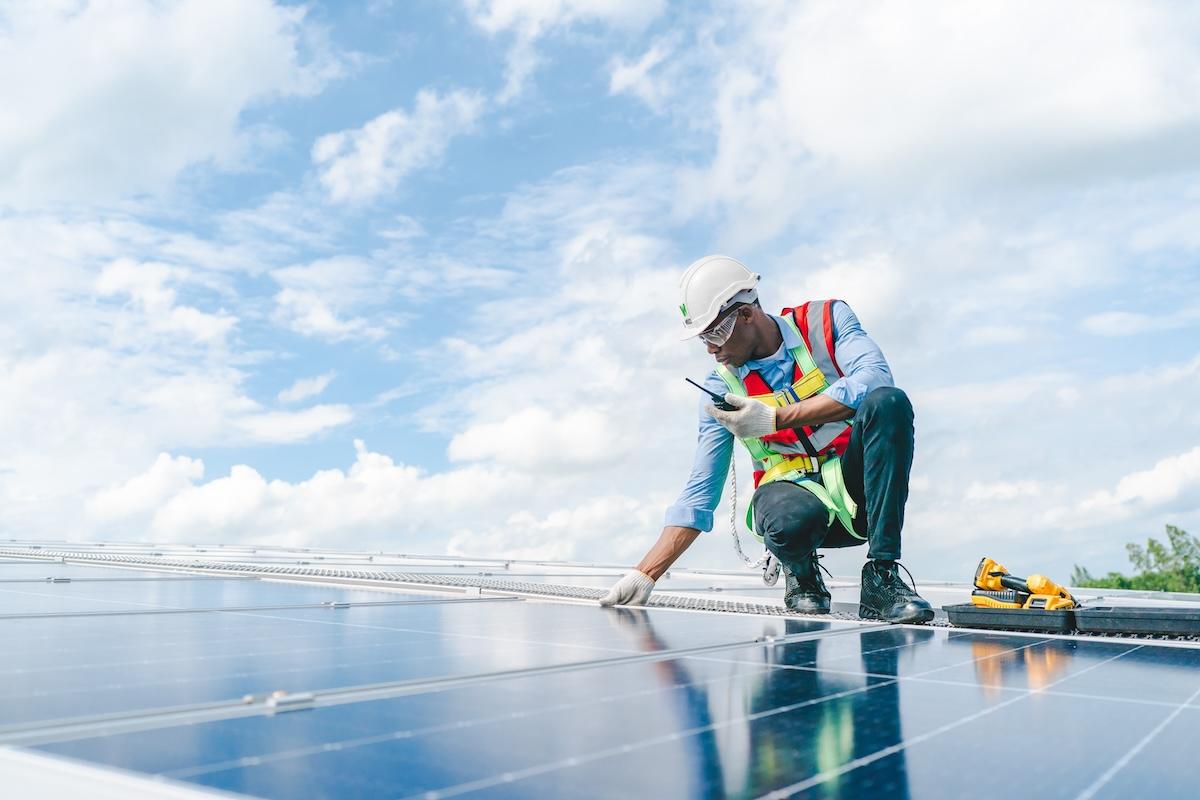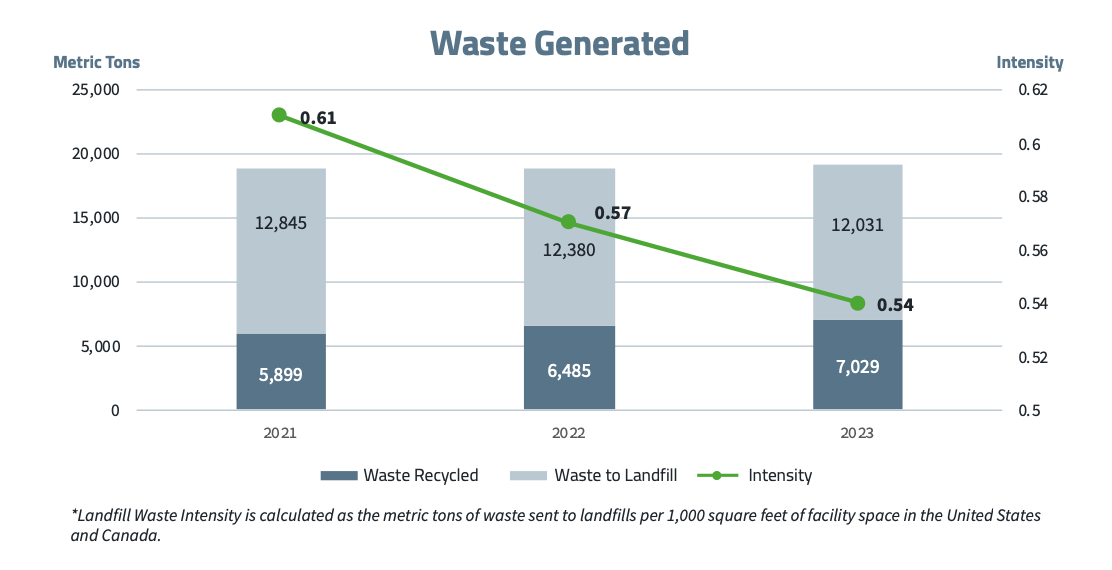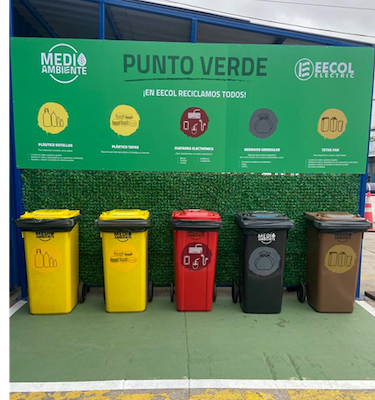Wesco 2024 Sustainability Report: Climate Change Risks and Opportunities
Read the 2024 Wesco Sustainability Report here
Climate Change Risks and Opportunities
At Wesco, we recognize the multifaceted nature of climate-related risks and opportunities, and have taken strategic measures to address them. As we align with the Task Force on Climate-Related Financial Disclosures (TCFD), our commitment extends beyond mere compliance. The index, featured at the end of this report, exemplifies our dedication to transparently disclosing our approach, assessing risks, and seizing opportunities in the face of climate change. As the global community grapples with the implications of a changing climate, Wesco continues to pursue sustainable practices and innovative solutions that not only mitigate risks but also unlock opportunities for a more resilient and sustainable future.
In addition to this report, further information on Wesco’s green house gas emissions and climate risk management can be found in our annual CDP climate change questionnaire response. View our current and past reports here, or on cdp.net.
To reduce energy use and emissions in our car fleet, we are continuing a three-year transition plan to move from employee-owned to company-leased vehicles. Employees in the U.S. and Canada who log more than 7,500 miles in business travel annually can optionally use a leased vehicle rather than their personal cars. Leased vehicles give us more control over our fuel use. We continue to explore more efficient vehicles, including electric and alternative fuel cars, for this program.
In 2023, we continued pilot testing of electric vehicles. We introduced six trucks into our fleet vehicles across three locations and analyzed their utilization. In 2024, we will continue monitoring this program and evaluate future expansion.
Water
As a distributor and services provider, we are not a major consumer of water. Our facilities primarily use water for sanitation, cleaning and irrigation purposes. We track water usage in our locations and use the data to identify unusual consumption patterns that could indicate undetected leaks or excessive usage that requires intervention. For example, our large distribution centers use sensors to detect water leakage and monitor average or excessive water use in bathroom water heaters and ice makers.
We also utilize a third-party system to alert us of abnormally high-water usage to help ensure we are managing consumption responsibly. In 2023, we responded to the CDP water security questionnaire for the third consecutive year and plan to respond annually moving forward.
Waste
We transport millions of products around the world each year, resulting in a solid waste stream comprising primarily non-hazardous packaging-related material. Our locations stored a minimal amount of hazardous waste with no spills in 2023.
Our top three waste streams are cardboard, wood pallets/reels, metal and plastic. We also have a minor waste stream produced by paper and batteries.
We continually work to find opportunities to reduce each of these waste streams by applying Lean principles. Within our waste stream, we also work to identify opportunities to reuse and recycle. Primary materials for recycle and reuse efforts:
- Paper-based packaging: When making customer deliveries, we take back cardboard when possible and reuse boxes for deliveries. Cardboard that cannot be used is recycled.
- Pallets/wood: We reuse, recycle, sell, or return good pallets to our suppliers.
- Wood reels: Where possible, we work with recycling and refurbishing partners so pallets and reels can be repaired or made into a new product. We also reuse our proprietary INSTA-REEL® reusable wood reels that are returned to us by customers.
- Batteries: We recycled 18 tons of batteries.
In 2022, we developed regional relationships with recycling vendors that recycle non-traditional waste streams, specifically metal and wood, which continued this year. Our locations have access to lighting and electronic waste recycling services offered by third-party vendors. This waste includes lamps, batteries, ballasts, electronics and computer equipment. We continuously look for opportunities to work with local companies that recycle our mainstream recyclables.
Finding Solutions-Printing Reports
A team of Wesco associates recognized a waste reduction opportunity to digitize reports that were previously printed automatically across 300 locations. The team worked together and found an existing software platform that digitally stored the reports which resulted in zero printing and making the information within the reports much easier to find. Prior to this solution, the reports used 10,000 reams or 25 tons of paper per year. Other savings include printer cartridges, decreased printer maintenance and labor costs.
Solution results: Eliminating 476,875 gallons of wastewater and 56,950 lbs of solid waste associate with the production of 25 tons of paper.
Cost savings: Estimated $830K annually
Global Efforts for Waste Reduction
Teams from across the globe have been making changes to encourage waste reduction. For example:
Chile
Employees recycled paper nationwide with the proceeds from the effort going to a foundation to help children in need of baby bottles.
Asia/Australia
Offices recycled paper, wood, metal and plastic in 2023. Recycling bins for plastic and cans were added at Singapore locations.
United Kingdom
Employees recycled 113 tons of paper, cardboard, steel, plastic, wood and other mixed recyclables.
To learn more, download the 2024 Wesco Sustainability Report here.
About This Report
Unless otherwise stated, this report covers activities, data and initiatives from our fiscal year 2023.
ESG Disclosure and Framework Alignment
The topics covered in this report include those that we have determined to be material for our business and stakeholders as noted on page 12. Wesco aligns with several ESG frameworks and disclosures in support of our commitment to transparency and our fulfillment of stakeholder needs and expectations. We leverage the following frameworks and standards to provide robust ESG information disclosure:
- Global Reporting Initiative (GRI): GRI offers a list of global standards and guidelines around sustainability reporting.
- Sustainability Accounting Standards Board (SASB): SASB provides a comprehensive set of industry-specific disclosure topics and guidelines.
- Task Force on Climate-Related Financial Disclosures (TCFD): TCFD provides disclosure recommendations on thematic ESG topics such as governance, strategy, risk management, metrics and targets to provide stakeholders with fuller information surrounding climate risks.
- CDP: Formerly the Carbon Disclosure Project, CDP is an international organization that helps companies and cities measure and disclose important environmental impact information through an annual questionnaire and rating system.
- United Nations Global Compact (UNGC): UNGC is an initiative that aims to help businesses align their strategies and work toward the U.N.’s Sustainable Development Goals.
- United Nations Sustainable Development Goals (U.N. SDGs): U.N. SDGs provide a shared set of 17 toward peace and prosperity for people and planet goals and create a call to action by all countries in a global partnership.
We also regularly engage with our investors, employees, customers, regulators, ratings agencies and others on ESG and business issues. Additional information about Wesco can be found in our public financial filings—including our annual report and proxy filings—as well as on the Security and Exchange Commission’s website at www.sec.gov or on the Investors page of our website at Wesco.com.
Wesco plans to continue to report annually as we monitor, measure, and deepen our ESG initiatives and disclosures.
Wesco endorses the United Nations Sustainable Development Goals (SDGs), which are a call to action to end poverty, protect the planet, and ensure that all people enjoy peace and prosperity.
More information about our SDG aligned initiatives is included throughout this report.
Assurance
We did not seek third-party assurance for this report; however, we will consider doing so for future reporting. The information and data contained in this report was vetted by internal subject matter experts on the various ESG topics included in this report.
Contact Us
We appreciate and welcome feedback on our ESG initiatives and reporting and invite you to contact us directly via email at Sustainability@Wesco.com.




